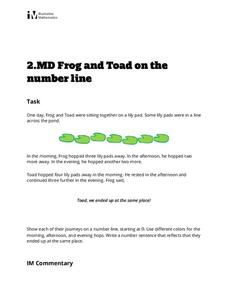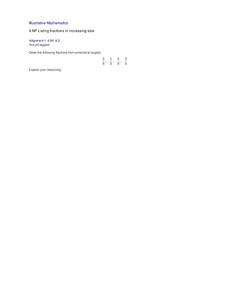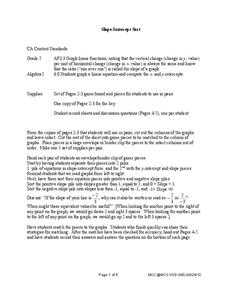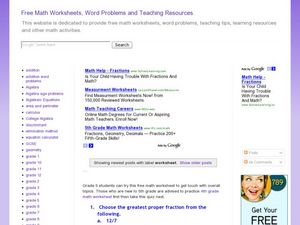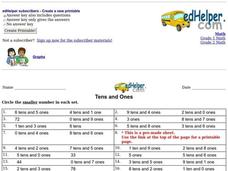Math Worksheets Land
Compare Two-Digit Numbers - Guided Lesson
Practice comparing number values in a variety of activities on this worksheet. Youngsters complete a statement comparing 20 to 20, choosing from three options: is greater than, is less than, and is equal to. Then, they put four numbers...
Curated OER
Amanda Bean's Amazing Dream
Use the book Amanda Bean's Amazing Dream to inspire your learners to solve and create multiplication word problems. After listening to the story, they solve two "which is more" problems. They explain their thinking with images,...
Noyce Foundation
Apple Farm Field Trip
Monitor the growth of young mathematicians with a comprehensive addition and subtraction assessment. Using the context of a class field trip to an apple orchard, this series of four story problems allows children to demonstrate their...
Math Mammoth
Grade 1 Worktext
Use graphing, counting, and number lines to help first graders learn about addition and subtraction. An array of worksheets and activities are an excellent resource for your math lesson, whether you are focusing on counting skills...
Curated OER
Missing Hundred Square
Kids are presented with the problem of finding the missing numbers to each of nine 100s squares. They'll need to subtract and add to make each puzzle equal 100. Great challenge or daily warm-up activity.
Curated OER
Ordering Decimal Tenths (E)
In this ordering decimals learning exercise, 5th graders rewrite the sets of decimal numbers from least to greatest. Students order the decimals in the tenths value place into 5 sets of numbers.
Illustrative Mathematics
Frog and Toad on the Number Line
Administer a learning activity that challenges your class to use a number line in the form of lily pads. Learners are instructed to display the number of hops that Toad and Frog take during their journey on a number line. Young...
Curated OER
Ordering
Although there isn't much to this number ordering activity, it offers some solid practice in sequencing two and three-digit numbers. For each of the 20 sets of four numbers, learners re-write them in order from least to greatest. All...
Curated OER
Decimals and Percents
In this decimals and percents worksheet, 8th graders solve 26 different types of problems that include expressing numbers as a decimal and a percent. Then they change each number to fractions and determine the unknown number for each...
Curated OER
Tens and Units
In this math instructional activity, students create tally data tables to practice counting by tens. They also could extend the activity to create number sentences.
MEP: Demonstration Project
Unit 5 Probability Activities
Wow! Here is a 14-page package of activities to use when your math class is studying probability. There are a myriad of pertinent experiments for learners to try, such as rolling a self-constructed multi-faced three-dimensional...
Yummy Math
Happy 14th B’ak’tun, the start of the next Great Mayan cycle
The ancient Mayans had a complex calendar and number system with a rich history. In fact, the date 12/21/2012 was the center of much controversy as to whether or not it was the end of time. It wasn't the end of time, but...
Curated OER
Spin a Window!
How many windows does this school bus have? If your class is new to counting, this will be a fun way to get them some practice. Cut out and laminate the spinner template and set it up to spin (instructions written out if you need them)....
EngageNY
Comparing Integers and Other Rational Numbers
The ninth installment of a 21-part module has pupils compare integers and rational numbers in decimal and fraction form. They match stories to number lines and compare values in the stories.
Illustrative Mathematics
Listing Fractions in Increasing Size
Increase the depth of your class's fractional number sense with this number-ordering activity. Given four fractions, each with different numerators and denominators, young learners are asked to place them in order from smallest to...
Virginia Department of Education
Equations of Lines
Scholars connect slope-intercept form and standard form to the values of m and b by first matching a set of cards that have slope-intercept form, standard form, values of m, values of b, and graphs of linear equations. They then...
Teach Engineering
Discovering Phi: The Golden Ratio
Fe, phi, fo, fum. This activity leads pairs to find the ratio of consecutive terms of the Fibonacci sequence. The pairs find that the Fibonacci sequence can be found in many places. A discussion with the class shows that the ratios...
Raytheon
Adding and Subtracting Decimals
For this adding and subtracting decimals instructional activity, students add and subtract numbers with decimals in word problems. Students complete 12 word problems.
West Contra Costa Unified School District
Slope-Intercept Sort
What's so special about slope? Pupils first match cards with slope and y-intercept to graphs of linear equations. They continue the lesson by matching equations in slope-intercept form to the same graphs.
Illustrative Mathematics
Building toward fluency
Here is a great learning task that focuses on the development of areas in computational fluency including strategies in mental math. Young learners are guided through a list of addition expressions that help them visually understand the...
Curated OER
Find the Biggest Number
In this online interactive math skills activity, students examine a series of 4 one and two-digit numbers and identify the largest number in the series. Students may submit their answers to be scored.
Curated OER
1st Grade Math Review
In this math review worksheet, 1st graders respond to 20 multiple choice questions that serve as a review of addition facts, subtraction facts, odd and even numbers, and calendar skills.
Curated OER
4th Grade Math Worksheet
In this 4th grade math review activity, students respond to 60 multiple choice questions that review of fractions, decimals, geometry, number sense, and computation.
EdHelper
Tens and Ones
In this tens and ones activity, students read the sets of numbers in each example that are written by tens and ones. Students circle the smaller number in the 24 problems.








